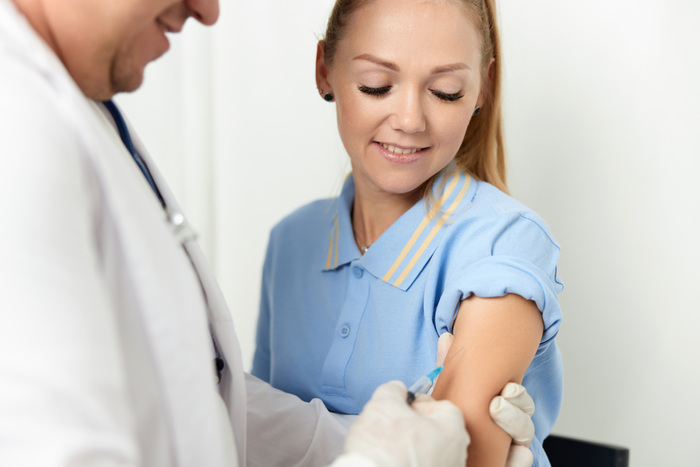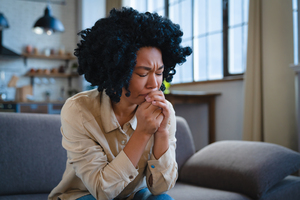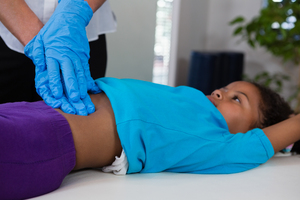Key points
- The MMR vaccine protects against measles, mumps, and rubella, using weakened versions of the viruses to train your immune system.
- It's recommended for most people, especially those who didn't receive it as a child, with a two-dose schedule for children and catch-up doses for adults.
- Some groups, such as college students, healthcare workers, military personnel, international travelers, and women planning to become pregnant, are particularly at risk and should ensure they're vaccinated.
- The vaccine is generally safe with mild side effects, but those with severe allergies, pregnant women, and those with weakened immune systems should not receive it.

The MMR vaccine might sound like just another item on your child’s vaccination list, but it’s actually one of the most important. This vaccine helps your body fight off three serious illnesses: measles, mumps, and rubella. These diseases are contagious and can cause serious complications—especially in young children and adults who aren’t protected.
The MMR vaccine has been safely used for decades. It’s highly effective, and following the CDC-recommended schedule helps protect not just yourself but your whole community. Whether you’re a parent, an adult who missed a dose or preparing to travel, here’s what you need to know about the MMR vaccine.
What is the MMR vaccine?
The MMR vaccine is a combination shot that protects against three viral infections: measles, mumps, and rubella. It’s a live attenuated vaccine, which means it uses weakened versions of the viruses to train your immune system to recognize and fight them off if you’re exposed in the future.
Here’s what each part of the vaccine helps prevent:
- Measles causes a red rash, high fever, and cough. It can lead to pneumonia, brain swelling, and even death. It spreads easily through the air and is especially dangerous for young children.
- Mumps is known for causing swollen cheeks and jaw (due to swollen salivary glands), fever, and muscle aches. In severe cases, it can lead to hearing loss or infertility in men.
- Rubella, or German measles, is usually mild in kids and adults. But during pregnancy, it can cause serious birth defects like heart problems, deafness, and developmental delays.
The MMR vaccine has been used since the 1970s and has helped reduce measles cases by over 99% in the U.S. That’s a huge public health win.
Who should get the MMR vaccine?
Most people should get the MMR vaccine, especially if they didn’t receive it as a child or aren’t sure if they’re protected. Here’s a breakdown:
For children
- First dose: Between 12 and 15 months of age
- Second dose: Between 4 and 6 years old
This two-dose schedule offers strong, long-lasting protection.
For teens and adults who missed it
If you didn’t get vaccinated as a child, it’s not too late. You should get caught up—especially if you’re part of a high-risk group.
At-risk groups who need the vaccine:
- College students
- Healthcare workers
- Military personnel
- International travelers
- Women planning to become pregnant (get vaccinated at least one month before trying to conceive)
If you're not sure whether you've had the MMR vaccine, your doctor can do a simple blood test to check your immunity.
Who shouldn’t get the MMR vaccine?
While the MMR vaccine is safe for most people, there are a few exceptions. You should not get the vaccine if:
- You have a severe allergy to any part of the vaccine (like gelatin or neomycin)
- You’re pregnant (wait until after delivery to get vaccinated)
- You have a weakened immune system, such as from cancer treatments or HIV/AIDS
Always talk to your doctor if you have questions about whether the vaccine is safe for you or your child.
When to see a doctor for the MMR vaccine
Wondering if it’s time to get the MMR vaccine? Here are some key situations where you should check in with a healthcare provider:
- You never received it as a child (or only got one dose)
- You’re planning to travel internationally
- There’s a measles outbreak in your area
- You’re preparing for pregnancy
- You don’t remember your vaccination history
It’s easy to get vaccinated through your primary care doctor or an urgent care clinic. Many clinics offer same-day appointments, and you can book through platforms like Solv to find one near you.
What to expect after the MMR vaccine
Most people don’t have any major issues after getting the MMR vaccine. Side effects are usually mild and go away on their own. Here’s what you might experience:
- Sore arm at the injection site
- Mild rash
- Low-grade fever
- Temporary joint pain (especially in adults)
Serious side effects are very rare, but it’s good to know the signs to watch for. Call your doctor if you notice:
- High fever
- Severe allergic reaction (trouble breathing, swelling of the face or throat)
- Long-lasting rash or joint pain
Book your MMR vaccine at a clinic near you
Getting the MMR vaccine is one of the simplest and most effective ways to protect yourself and others from serious illness. If you or your child are due for a shot—or you’re just not sure about your status—now is the perfect time to get up to date.
Solv makes it easy to find and book same-day appointments at clinics offering the MMR vaccine. Don’t wait—your health and your community’s well-being are worth it.
FAQs
What is the MMR vaccine and what diseases does it protect against?
The MMR vaccine is a combination shot that protects against three viral infections: measles, mumps, and rubella. These diseases are contagious and can cause serious complications, especially in young children and adults who aren't protected.
Who should receive the MMR vaccine and when?
Most people should get the MMR vaccine, especially if they didn't receive it as a child or aren't sure if they're protected. Children should get their first dose between 12 and 15 months of age and a second dose between 4 and 6 years old. Adults who missed the vaccine as a child should also get vaccinated, especially if they're part of a high-risk group such as college students, healthcare workers, military personnel, international travelers, or women planning to become pregnant.
Are there any individuals who should not get the MMR vaccine?
Yes, while the MMR vaccine is safe for most people, there are a few exceptions. Individuals should not get the vaccine if they have a severe allergy to any part of the vaccine, if they're pregnant, or if they have a weakened immune system, such as from cancer treatments or HIV/AIDS.
When should one consult a doctor regarding the MMR vaccine?
You should check in with a healthcare provider if you never received the MMR vaccine as a child, if you're planning to travel internationally, if there's a measles outbreak in your area, if you're preparing for pregnancy, or if you don't remember your vaccination history.
What are the possible side effects of the MMR vaccine?
Most people don't have any major issues after getting the MMR vaccine. Side effects are usually mild and go away on their own, including a sore arm at the injection site, mild rash, low-grade fever, and temporary joint pain. Serious side effects are very rare, but can include high fever, severe allergic reaction, or long-lasting rash or joint pain.









